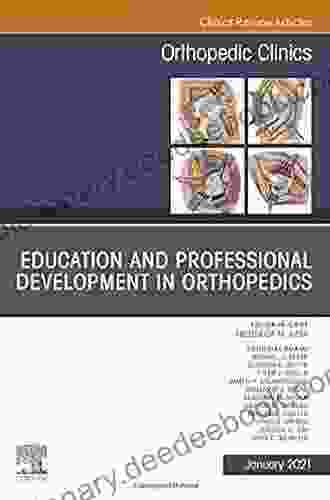Education and Professional Development in Orthopedics

This issue of Orthopedic Clinics of North America focuses on Education and Professional Development in Orthopedics. Articles will include:
- The Evolution of Residency Training and Research
- Medical Student Education in Orthopedics
- Faculty Development in Orthopedics
- Continuing Medical Education in Orthopedics
- The Role of Technology in Orthopedic Education
The Evolution of Residency Training and Research
The training of orthopedic residents has undergone significant changes in recent years. The traditional model of a five-year residency has been replaced by a more flexible system that allows residents to tailor their training to their individual needs. This has been driven by a number of factors, including the increasing complexity of orthopedic surgery, the need for more specialized training, and the desire of residents to have more control over their careers.
4.7 out of 5
| Language | : | English |
| File size | : | 16927 KB |
| Text-to-Speech | : | Enabled |
| Enhanced typesetting | : | Enabled |
| Print length | : | 237 pages |
| Screen Reader | : | Supported |
One of the most significant changes in residency training has been the of the Accreditation Council for Graduate Medical Education (ACGME) Common Program Requirements. These requirements have standardized the training of residents in all orthopedic residency programs. This has ensured that all residents receive the same basic level of training, regardless of the program they attend.
Another major change in residency training has been the increased emphasis on research. Residents are now required to complete a research project as part of their training. This has helped to foster a culture of research in orthopedics and has led to a number of important advances in the field.
Medical Student Education in Orthopedics
Medical student education in orthopedics is also undergoing changes. Traditionally, medical students have received only a limited exposure to orthopedics during their preclinical years. This is now changing, as more medical schools are recognizing the importance of orthopedics in the overall care of patients.
One of the most important changes in medical student education in orthopedics has been the of early exposure programs. These programs allow medical students to gain experience in orthopedics before they begin their clinical rotations. This has helped to increase the interest of medical students in orthopedics and has led to a more informed decision-making process when choosing a residency program.
Another important change in medical student education in orthopedics has been the development of new teaching methods. These methods include the use of simulation, cadaver labs, and online resources. These methods have helped to make the learning of orthopedics more interactive and engaging for medical students.
Faculty Development in Orthopedics
Faculty development in orthopedics is essential for ensuring that the next generation of orthopedic surgeons is well-prepared to meet the challenges of the future. Faculty development programs provide orthopedic surgeons with the skills and knowledge they need to be effective educators, mentors, and researchers.
One of the most important aspects of faculty development is teaching skills training. This training helps orthopedic surgeons to develop the skills they need to effectively teach medical students and residents. Teaching skills training programs typically cover a variety of topics, such as curriculum development, teaching methods, and assessment techniques.
Another important aspect of faculty development is research training. This training helps orthopedic surgeons to develop the skills they need to conduct research and publish their findings. Research training programs typically cover a variety of topics, such as research design, data analysis, and scientific writing.
Continuing Medical Education in Orthopedics
Continuing medical education (CME) is essential for orthopedic surgeons to stay up-to-date on the latest advances in the field. CME programs provide orthopedic surgeons with the opportunity to learn about new surgical techniques, new technologies, and new research findings.
There are a variety of CME programs available to orthopedic surgeons. These programs can be delivered in a variety of formats, including live lectures, webinars, and online courses. Orthopedic surgeons can choose the CME programs that best meet their individual needs and learning preferences.
The Role of Technology in Orthopedic Education
Technology is playing an increasingly important role in orthopedic education. Technology can be used to deliver educational content, facilitate communication between educators and learners, and assess learning outcomes.
One of the most important ways that technology is being used in orthopedic education is to deliver educational content. This can be done through a variety of means, such as online lectures, webinars, and simulations. Technology can also be used to create interactive learning modules that allow learners to explore complex topics in a self-paced environment.
Technology can also be used to facilitate communication between educators and learners. This can be done through a variety of means, such as email, discussion boards, and social media. Technology can also be used to create online communities where learners can share ideas and collaborate on projects.
Finally, technology can be used to assess learning outcomes. This can be done through a variety of means, such as online quizzes, tests, and surveys. Technology can also be used to track learner progress over time and identify areas where learners need additional support.
Education and professional development are essential for orthopedic surgeons to stay up-to-date on the latest advances in the field and to provide the best possible care for their patients. The articles in this issue of Orthopedic Clinics of North America provide a comprehensive overview of the current state of education and professional development in orthopedics. These articles will be of interest to orthopedic surgeons at all stages of their careers.
4.7 out of 5
| Language | : | English |
| File size | : | 16927 KB |
| Text-to-Speech | : | Enabled |
| Enhanced typesetting | : | Enabled |
| Print length | : | 237 pages |
| Screen Reader | : | Supported |
Do you want to contribute by writing guest posts on this blog?
Please contact us and send us a resume of previous articles that you have written.
 Book
Book Novel
Novel Story
Story Genre
Genre Reader
Reader Library
Library Paperback
Paperback E-book
E-book Magazine
Magazine Paragraph
Paragraph Sentence
Sentence Bibliography
Bibliography Preface
Preface Footnote
Footnote Manuscript
Manuscript Codex
Codex Bestseller
Bestseller Library card
Library card Biography
Biography Memoir
Memoir Reference
Reference Encyclopedia
Encyclopedia Thesaurus
Thesaurus Character
Character Catalog
Catalog Card Catalog
Card Catalog Stacks
Stacks Periodicals
Periodicals Research
Research Lending
Lending Reserve
Reserve Rare Books
Rare Books Special Collections
Special Collections Interlibrary
Interlibrary Thesis
Thesis Dissertation
Dissertation Storytelling
Storytelling Awards
Awards Reading List
Reading List Book Club
Book Club C Kay Gooch
C Kay Gooch Alexander Betts
Alexander Betts Eileen Lettick
Eileen Lettick Emma J Virjan
Emma J Virjan Joshua Griffith
Joshua Griffith Monique Bucheger
Monique Bucheger Keith Urban
Keith Urban Hugh Cornwell
Hugh Cornwell Ramsay Burt
Ramsay Burt John Howard Reid
John Howard Reid Hourly History
Hourly History Stephanie Kay
Stephanie Kay Jennifer Ann Bailey
Jennifer Ann Bailey Timothy Willard
Timothy Willard Karan Singh
Karan Singh Jim Scorzelli
Jim Scorzelli Rebecca Gallo
Rebecca Gallo Sally Rooney
Sally Rooney Anne Haas Dyson
Anne Haas Dyson Susan Wittig Albert
Susan Wittig Albert
Light bulbAdvertise smarter! Our strategic ad space ensures maximum exposure. Reserve your spot today!

 Brody PowellComprehensive Guide to Price Forecasting Models for Nippon Electric Glass Ltd...
Brody PowellComprehensive Guide to Price Forecasting Models for Nippon Electric Glass Ltd... Will WardFollow ·12.9k
Will WardFollow ·12.9k Holden BellFollow ·8.2k
Holden BellFollow ·8.2k Henry GreenFollow ·6.1k
Henry GreenFollow ·6.1k Colin RichardsonFollow ·10.6k
Colin RichardsonFollow ·10.6k Easton PowellFollow ·5.1k
Easton PowellFollow ·5.1k Brody PowellFollow ·17.7k
Brody PowellFollow ·17.7k Ryan FosterFollow ·12.8k
Ryan FosterFollow ·12.8k James HayesFollow ·8.9k
James HayesFollow ·8.9k

 Jerome Powell
Jerome PowellBarbara Randle: More Crazy Quilting With Attitude -...
A Trailblazing Pioneer in...

 Jan Mitchell
Jan MitchellLapax: A Dystopian Novel by Juan Villalba Explores the...
In the realm of dystopian literature, Juan...

 Rodney Parker
Rodney ParkerOur Mr. Wrenn: The Romantic Adventures of a Gentle Man
Our Mr. Wrenn is a 1937 novel...
4.7 out of 5
| Language | : | English |
| File size | : | 16927 KB |
| Text-to-Speech | : | Enabled |
| Enhanced typesetting | : | Enabled |
| Print length | : | 237 pages |
| Screen Reader | : | Supported |
















